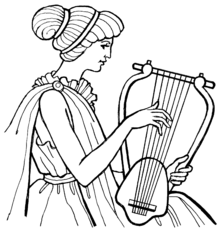lyre
Jump to navigation
Jump to search
See also: lyře
English
[edit]
Etymology
[edit]From Ancient Greek λύρᾱ (lúrā, “lyre, a stringed instrument with a sounding-board formed of the shell of a tortoise”). Doublet of lira and Lyra.
Pronunciation
[edit]- (UK) IPA(key): /ˈlaɪ.ə/
Audio (Southern England): (file)
- (US) IPA(key): /ˈlaɪ.ɚ/, /laɪɹ/
- Rhymes: -aɪə(ɹ)
- Homophones: liar, lier, lire
Noun
[edit]lyre (plural lyres)
- An ancient stringed musical instrument (a yoke lute chordophone) of Greek origin, consisting of two arms extending from a body to a crossbar (a yoke), and strings, parallel to the soundboard, connecting the body to the yoke.
- Any instrument of the same musicological classification; any yoke lute.
- A lyre-shaped sheet music holder that attaches to a wind instrument when a music stand is impractical.
- (obsolete) A composer of lyric poetry.
Synonyms
[edit]- (a general class of instruments): yoke lute
Derived terms
[edit]Related terms
[edit]Translations
[edit]stringed musical instrument
|
lyre-shaped music holder
|
References
[edit]- 2012. Kisir and Tanbura. Dahab Khalil and Artur Simon. Pg. 96.
- 2007. Origins and Development of Musical Instruments. Jeremy Montagu. Pg. 128.
Verb
[edit]lyre (third-person singular simple present lyres, present participle lyring, simple past and past participle lyred)
- (rare) to play the lyre
- 1922, Thomas Hardy, “Penance”, in Late Lyrics and Earlier with Many Other Verses, London: Macmillan and Co., […], →OCLC, page 143:
- Alas, far times ago / A woman lyred here / In the evenfall; one who fain did so / From year to year; / And, in loneliness bending wistfully, / Would wake each note / In sick sad rote, / None to listen or see!
See also
[edit]Further reading
[edit]- “lyre”, in Webster’s Revised Unabridged Dictionary, Springfield, Mass.: G. & C. Merriam, 1913, →OCLC.
- “lyre”, in The Century Dictionary […], New York, N.Y.: The Century Co., 1911, →OCLC.
Anagrams
[edit]French
[edit]Pronunciation
[edit]Noun
[edit]lyre f (plural lyres)
- lyre
- This term needs a translation to English. Please help out and add a translation, then remove the text
{{rfdef}}.
Descendants
[edit]Further reading
[edit]- “lyre”, in Trésor de la langue française informatisé [Digitized Treasury of the French Language], 2012.
Norwegian Bokmål
[edit]Noun
[edit]lyre f or m (definite singular lyra or lyren, indefinite plural lyrer, definite plural lyrene)
Anagrams
[edit]Norwegian Nynorsk
[edit]Noun
[edit]lyre f (definite singular lyra, indefinite plural lyrer, definite plural lyrene)
Derived terms
[edit]Categories:
- English terms derived from Ancient Greek
- English doublets
- English 2-syllable words
- English terms with IPA pronunciation
- English terms with audio links
- English 1-syllable words
- Rhymes:English/aɪə(ɹ)
- Rhymes:English/aɪə(ɹ)/1 syllable
- English terms with homophones
- English lemmas
- English nouns
- English countable nouns
- English words ending in "-yre"
- English terms with obsolete senses
- English verbs
- English terms with rare senses
- English terms with quotations
- en:String instruments
- French 1-syllable words
- French terms with IPA pronunciation
- French terms with audio links
- French lemmas
- French nouns
- French countable nouns
- French feminine nouns
- fr:String instruments
- Norwegian Bokmål lemmas
- Norwegian Bokmål nouns
- Norwegian Bokmål feminine nouns
- Norwegian Bokmål masculine nouns
- Norwegian Bokmål nouns with multiple genders
- nb:Musical instruments
- Norwegian Nynorsk lemmas
- Norwegian Nynorsk nouns
- Norwegian Nynorsk feminine nouns
- nn:Musical instruments
